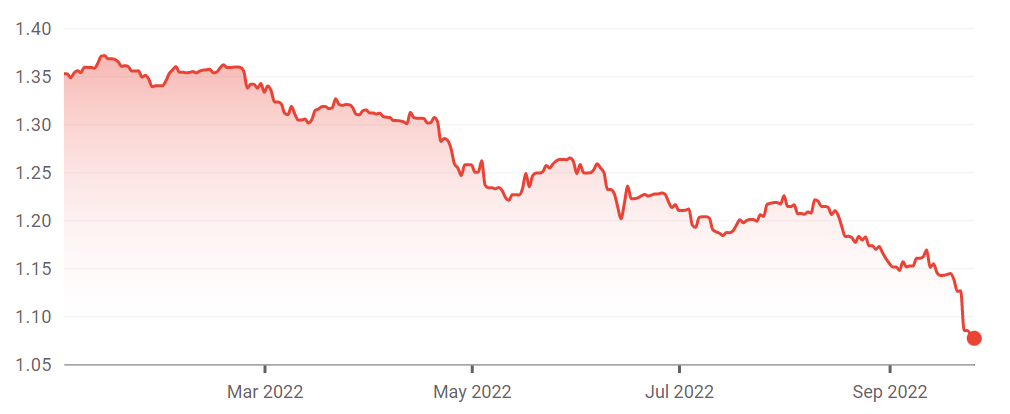The pound dropped to an historic low after the market railed against Friday’s ‘mini Budget’ and hints from the chancellor that more tax cuts are in the pipeline.
Sterling was trading close to $1.03 – it’s lowest level ever against the dollar since Britain went decimal in 1971 – early in the Asian session before gaining some ground when the domestic market opened.
As of 10:30am, it stood at $1.08 – which is an improved position but some way off the $1.14 it was at a week ago.
Traders have been selling sterling after chancellor Kwasi Kwarteng last week unveiled a £45bn growth package that promised the UK's biggest tax cuts in 50 years but sparked concern that government borrowing will surge to fulfill it.
Over the weekend, Kwarteng told the BBC there was “more to come” as he wants to keep cutting taxes as part of his economic growth strategy, stoking market fears of more borrowing and inflationary pressures.
Sterling vs dollar over 2022

Source: Google Finance
Susannah Streeter, senior investment and markets analyst at Hargreaves Lansdown, said: “The fresh bout of panic appears to have been brought on by rumours that the Bank of England may step in with an emergency rate hike to try and shore up support.
“But comments by chancellor Kwasi Kwarteng that he will go even further with historic tax cuts, which are already being criticised as reckless, have added to the anxiety.
“The worry is that not only will borrowing balloon to eyewatering levels, but that the fires of inflation will be fanned further by this tax giveaway, which offers higher earners the bigger tax break.”
Neil Wilson, chief market analyst at Markets.com, said the market appears to be pricing in 150 basis points of rate hikes by November, which implies it expects the Bank to announce an increase before next month’s monetary policy meeting.
“The central bank is in a tough place and any intervention might only be a sticking plaster as the path of least resistance for the pound is lower - parity gravity. Despite this, to not act would be willful neglect,” he said.
“Just as the chancellor has taken a reckless approach to fiscal policy – a kind of economic vandalism – the BoE needs to take a very considered approach to monetary policy.”
However, Wilson pointed out that inter-meeting hikes “can look like panic” and said Bank governor Andrew Bailey does not have a reputation for acting swiftly, so any intervention may not arrive as quickly as some think.
That said, if the Bank fails to act and the pound continues to tank, then the Bank “would be as guilty as Kwarteng”, he added.
Ben Laidler, global markets strategist at eToro, highlighted the fact that several other central banks have moved to prop up their currencies in recent days, but added that the Bank of England might find it harder.
“The UK authorities have no good options to address the current currency crisis, with potential for an emergency increase in interest rates rising,” he said.
“Others from China to Japan have intervened in recent days to try and curb their weakening currencies. But the UK is in a tougher situation with higher inflation, much lower foreign exchange reserves, and fiscal policy now pulling in the opposite direction.”
In stock markets, the FTSE 100 opened higher as a weaker sterling actually benefits many of its members, although it has since joined other European markets in falling as investors continue to worry about a slower economy.
Steve Clayton, fund manager at HL Select, said today’s trading session could look like the one that followed the Brexit referendum: sterling being hit hard but the stock market doing better.
“The UK market is very international in its nature; most big companies listed in London actually earn most of their revenues and profits overseas. Those will be worth more in sterling terms as a result of the slump in the pound. So, expect shares in major stocks with big overseas earnings to lead the way today,” he explained.
“Domestic earnings though will be threatened. Retailers and other businesses who buy their inventory in from abroad face a loss of earnings. They can try to pass the higher cost of imported goods on to consumers, or they can try to cut their operating costs. But the speed with which sterling has fallen is going to prove a huge challenge.”




